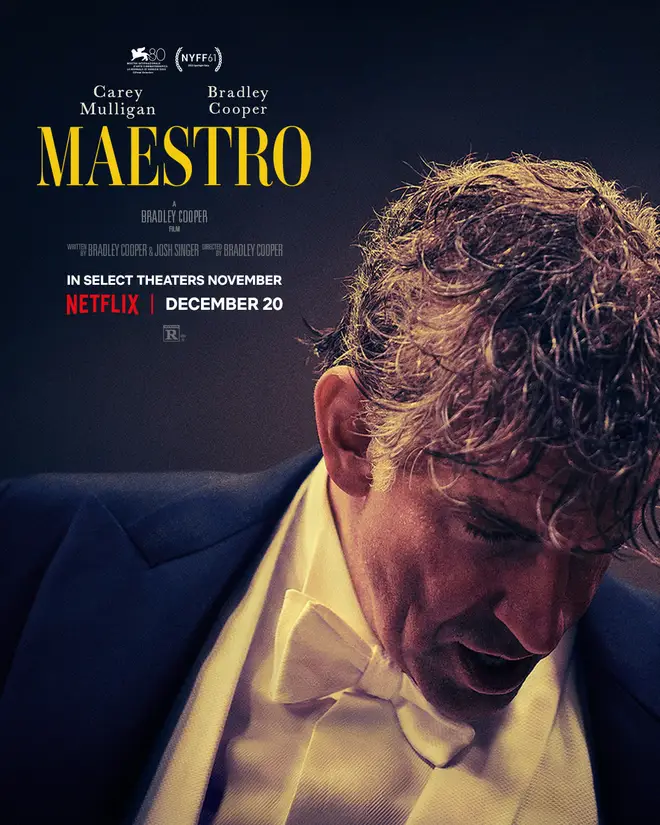Bradley Cooper’s latest film ‘Maestro’ was released in September, hence many of you might have seen it already. In typical manner, I was slightly slow to watch it as I am with most things, but I finally got to it and it only took about four months. The film was rightfully nominated for a plethora of awards including academy award nominations for lead actors Bradley Cooper and Carey Mulligan.
Prior to watching, I wasn’t familiar with Leonard Bernstein’s musical legacy because it was before my time and because I’m not big into orchestral music. I know, how millennial of me right? Maestro was so well directed, acted and produced that by the end of the movie, I had huge admiration for Leonard Bernstein and the music he benefacted to society.
Maestro’s Plot
The film is a biographical take on American composer Leonard Bernstein’s life and his complicated relationship with his wife Felicia Montealegre. Maestro embarks on an interesting journey steered by Bradley Cooper’s unique direction. Generally, in biographies, especially those of famous musicians or artists, the movies depict more of their successful careers rather than delving into their personal lives.
Maestro does the opposite. The film kicks off with Bernstein’s first breakout orchestra performance followed by his first encounter with Felicia. The remainder of the film focuses on their ever-growing relationship over the years sprinkled with glimpses of Bernstein’s musical success and Montealegre’s growing presence as an actress in Hollywood.
I think this is one of the factors that makes the movie unique because if you were interested in learning about Leonard Bernstein’s musical career and successes you could simply read about it or listen to his music. Whereas Maestro displays the romantic side of Bernstein’s life cantered around his complicated relationship with his wife and children.
Cast of Maestro

The film is endowed with a cast of Hollywood A-listers and like any other highly acclaimed movie, the incredible actors played the most important part in bringing Cooper’s unique direction to life. Besides lead co-stars Bradley Cooper and Carey Mulligan, the stellar list includes Matt Bomer, Sarah Silverman and Maya Hawke among other recognizable faces.
Initially in the movie, Cooper, Mulligan and Bomer’s characters are involved in a complicated love triangle because Leonard Bernstein and David Oppenheim (Matt Bomer) were co-workers and lovers who seemed to be having a good relationship until Felicia Montealegre comes along and sweeps Bernstein off his feet. The movie does not focus on the intricate details of the love triangle which allows the audience to fill in these unspoken gaps.
During this time, all three actors played their parts brilliantly to create that tension within the characters and the facial expressions were on point which is why no words were needed because we as the audience could tell exactly what each of them were thinking.
The movie is filled with scenes like these where just by creating tension through exquisite acting, we could understand the themes and character dynamic being implied such as awkwardness, tension, and other wide array of emotions like guilt, remorse, awe, envy, grief and joy. From an acting perspective, I think every actor did an amazing job in their respective roles and it’s unsurprising that there were Golden Globe and Academy Award nominations.
Writing and Dialogue
The screenplay for the movie was written by Bradley Cooper and Josh Singer and they did an excellent job of it. I don’t normally enjoy dialogue heavy movies because they can be executed poorly sometimes, and the entire point of the film can get lost but mostly just because I struggle to stay focused for long periods of time. However, I particularly enjoyed the dialogues in this movie because it didn’t feel like I was watching a stereotypical movie where each line uttered was a predictable one.
In Maestro, the dialogues glided in a very natural way that it seemed like you were watching a group of people interacting in everyday life. Okay, I’m not explaining it very well, let’s give this another try. Typically, when I watch a movie or a TV episode and there’s scene where two characters are arguing with each other, each actor says their line after the other one responds but in real life that is sometimes unrealistic because people don’t wait for each other to finish speaking before making their argument, especially if it’s a heated one.
Maestro reflected everyday interactions using their dialogues like in a scene where Bernstein and Felicia were arguing, both of them were screaming at each other and talking over one another rather than in the usual structured way of delivering dialogues. This was done throughout the movie, when characters were introduced to each other, both greeted each other at almost the exact moment so you could sometimes only make out half the words and this really mimicked everyday interactions in a natural way.
Personally, I found this very refreshing to see on screen and it definitely brought out an element of relatability and made it easier for me to stay focused on the deep character conversations as well. At times, it even felt like I was watching actors improvising their lines rather than following a script and I’m sure this was part of Bradley Cooper’s unique direction of the movie.
If you would like to check out other movie reviews, click here.






